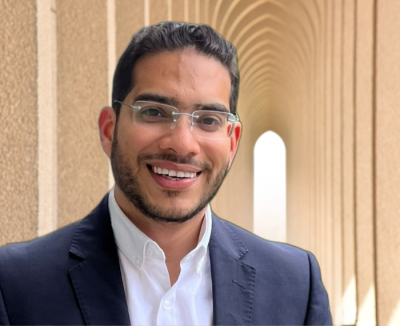
EMAIL
elaf.basri@kfupm.edu.sa
OFFICE LOCATION
24/130-2
EXTENSION
–
Dr. Elaf Basri is an Assistant Professor of Management and Organizational Behavior at KFUPM Business School. He earned his Ph.D. in Management (Organizational Behavior & Psychology) from the University of Edinburgh, where he received multiple awards including the prestigious Arnon Reichers Best Student Paper Award at the Academy of Management. His dissertation, “What Makes a Meaningful Day,” developed a dynamic theory of how employees and organizations craft “meaningfulness deals” and sustain purpose at work through variability, emotional diversity, and reciprocity over time.
His research and teaching focus on meaningful work, emotions at work, and employee well-being. More broadly, Dr. Basri’s scholarship examines how individuals and societies pursue meaning, well-being, and moral purpose in the changing world of work. He draws on positive psychology, moral psychology, and organizational sciences to explore how human values, technological change, and spiritual perspectives shape meaningful work and human flourishing. He is particularly driven by questions such as: How can individuals live lives that are both fulfilling and impactful? His research has been published in outlets such as the Academy of Management Proceedings and the Journal of Global Business Advancement, and he was a visiting scholar at Vrije Universiteit Amsterdam.
Methodologically, Dr. Basri employs multilevel and dynamic approaches, including daily diary and experience sampling methods, longitudinal designs, experiments, and person-centered analyses, alongside conceptual and qualitative work. This methodological breadth allows him to capture the complex, evolving dynamics of meaning and emotions at work.As an educator, Dr. Basri has taught and mentored students across undergraduate, graduate, and executive levels. He is an Associate Fellow of the Higher Education Academy (AFHEA) and is committed to student-centered, experiential, and values-driven learning. His teaching emphasizes not only knowledge but also reflection, purpose, and real-world application.
Alongside his academic work, Dr. Basri actively bridges academia and practice through consulting, advisory, and public scholarship. He draws on his earlier leadership experience at Saudi Aramco, where he led culture and change management for its $69B SABIC acquisition, launched a career counseling center serving over 30,000 employees, and developed HR systems for major subsidiaries, to inform practical solutions for today’s leadership, culture, and human capital challenges.
Ph.D. in Management (Organizational Behavior & Psychology), 2025 – The University of Edinburgh
MBA, 2021 – King Fahad University of Petroleum & Minerals
MA in Psychology, 2017 – Saybrook University
BSc in Management Information Systems and Finance (Minors in Psychology, Cultural Anthropology, International Affairs), 2012 – Northeastern University
Meaningful Work
Emotions at Work
Employee Well-being
Work Motivation
Organizational Behavior
Leadership, Culture & Change
Basri, E., Murphy, S., Yue, Y., Stollberger, J. (2025). The Emotional Tapestry of Meaningfulness: How Emotional Diversity Shapes and Sustains Meaningful Work. The Academy of Management Annual Meeting, Copenhagen
Basri, E., Murphy, S., Yue, Y. (2024). Let’s Make a Deal! A Dynamic Model of Pursuing Meaningful Work Through Meaningfulness Deals. The Academy of Management Annual Meeting, Chicago
Basri, E., Murphy S., Yue, Y. (2024): What Makes a Meaningful Day? Navigating Reciprocity and Variability in Crafting Meaningfulness Deals. Academy of Management Proceedings, 2024, https://doi.org/10.5465/AMPROC.2024.37bp
Basri, E., Murphy, S., Yue, Y. (2023). Aspiring, living, and regaining meaningfulness: A psychosocial, dynamic model of enacting meaningful work pathways.
The European Group for Organizational Studies 39th Colloquium, Cagliari, Italy
Basri, E., Ghamdi, S., Kazmi, A. (2020). The macro and micro factors in effectiveness of innovation implementation in Saudi Arabia. Journal of Global Business Advancement, 12(6), 860-886. DOI: 10.1504/JGBA.2019.107749